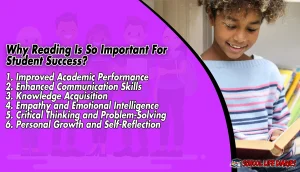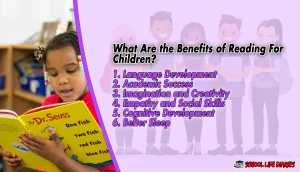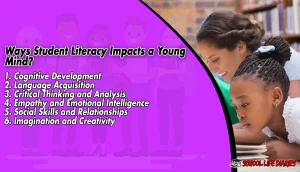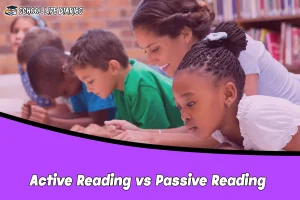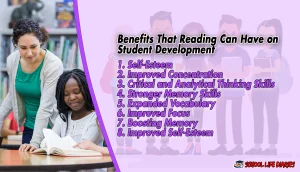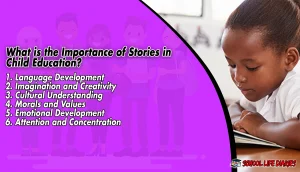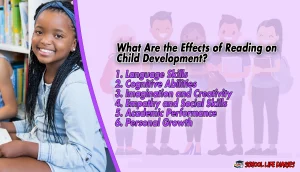Reading is a fundamental skill that plays a crucial role in the development and success of students. It goes beyond the mere act of deciphering words on a page; It encompasses comprehension, critical thinking, and language acquisition. In this article, we will explore the significance of reading in a student’s life, the benefits it offers, and its impact on their overall growth.
What is Reading?
Reading is the process of interpreting written words and deriving meaning from them. It involves decoding the symbols on a page, comprehending the message conveyed, and making connections with prior knowledge. Reading can take various forms, including reading books, articles, newspapers, and digital content.
Why Reading Is So Important For Student Success?
Reading plays a pivotal role in a student’s academic journey and overall success. Here are some reasons why reading is crucial for students:
1. Improved Academic Performance:
Reading enhances vocabulary, comprehension, and critical thinking skills, which are essential for academic excellence. It helps students understand complex concepts, analyze information, and express their thoughts effectively.
2. Enhanced Communication Skills:
Reading exposes students to a wide range of language patterns, sentence structures, and vocabulary. As they encounter different writing styles, they develop their own writing and communication skills, allowing them to express themselves with clarity and precision.
3. Knowledge Acquisition:
Through reading, students gain access to a vast pool of information and ideas. They can explore various subjects, cultures, and perspectives, broadening their horizons and fostering intellectual curiosity.
4. Empathy and Emotional Intelligence:
Reading fiction and narratives helps students develop empathy and emotional intelligence. By immersing themselves in different characters’ experiences, they learn to understand and relate to others, fostering empathy and social skills.
5. Critical Thinking and Problem-Solving:
Reading exposes students to different viewpoints and perspectives, enabling them to think critically and analyze information. They learn to question, evaluate evidence, and form informed opinions, essential skills for problem-solving.
6. Personal Growth and Self-Reflection:
Reading encourages self-reflection and personal growth. By exploring characters’ journeys and experiences, students can gain insights into their own lives, challenges, and aspirations, fostering self-awareness and personal development.
What Are the Benefits of Reading For Children?
Reading has numerous benefits for children. It lays the foundation for their cognitive, emotional, and social development. Here are some key benefits:
1. Language Development:
Reading helps children develop language skills, expand their vocabulary, and improve their grammar and syntax. It exposes them to proper sentence structure and enhances their ability to express themselves clearly.
2. Academic Success:
Children who read regularly often perform better academically. Reading improves their comprehension, critical thinking, and problem-solving abilities, enabling them to excel in various subjects.
3. Imagination and Creativity:
Reading stimulates children’s imagination and creativity. It transports them to different worlds, introduces them to diverse characters and cultures, and encourages them to think beyond the boundaries of their own experiences.
4. Empathy and Social Skills:
By reading stories that explore different perspectives, children learn to understand and empathize with others. They develop social skills, emotional intelligence, and the ability to build meaningful relationships.
5. Cognitive Development:
Reading enhances children’s cognitive abilities, including memory, attention span, and concentration. It exercises their brain, improves their analytical skills, and fosters intellectual growth.
6. Better Sleep:
Engaging in regular reading before bedtime can promote better sleep in children. It helps them relax, reduces stress, and creates a positive bedtime routine.
Ways Student Literacy Impacts a Young Mind?
Student literacy has a profound impact on young minds, shaping their cognitive abilities, emotional intelligence, and social skills. Here are some ways in which student literacy influences their development:
1. Cognitive Development:
Reading stimulates brain development and enhances cognitive abilities. It improves memory, attention span, and problem-solving skills, fostering overall intellectual growth.
2. Language Acquisition:
Reading exposes students to new words, sentence structures, and language patterns. It expands their vocabulary, improves their grammar, and helps them develop effective communication skills.
3. Critical Thinking and Analysis:
Through reading, students learn to think critically, analyze information, and draw evidence-based conclusions. It enhances their ability to question, evaluate, and form independent opinions.
4. Empathy and Emotional Intelligence:
Reading exposes students to diverse characters and their experiences, fostering empathy and emotional intelligence. It helps them understand and connect with others on a deeper level.
5. Social Skills and Relationships:
Reading promotes social interaction and the development of healthy relationships. It provides a platform for discussions, encourages shared reading experiences, and cultivates a sense of community.
6. Imagination and Creativity:
Reading fuels the imagination and creativity of students. It allows them to envision different worlds, scenarios, and possibilities, nurturing their creative thinking skills.
Active Reading vs Passive Reading
When it comes to reading, there are two primary approaches: active reading and passive reading. Active Reading involves engaging with the text actively. It includes strategies such as:
- Previewing the text before reading to gain an overview.
- Asking questions while reading to deepen understanding.
- Highlighting and underlining key points.
- Making connections with prior knowledge.
- Summarizing and reflecting on the content.
Active reading promotes comprehension, critical thinking, and retention of information. It encourages an interactive and analytical approach to reading.
On the other hand, Passive Reading refers to reading without actively engaging with the text. It involves reading for entertainment or leisure without a specific goal or active involvement.
Passive reading can still be enjoyable and beneficial, allowing individuals to relax and unwind. However, it may not promote deep comprehension or critical thinking to the same extent as active reading.
Benefits That Reading Can Have on Student Development
Reading offers a wide range of benefits that positively impact student development. Let’s explore some of these benefits:
1. Self-Esteem:
Reading can boost a student’s self-esteem. As they master new words, understand complex concepts, and successfully comprehend texts, they gain confidence in their abilities. Additionally, reading about characters who overcome challenges and achieve success can inspire students to believe in themselves.
2. Improved Concentration:
Regular reading enhances a student’s concentration skills. When engrossed in a book or article, they learn to focus their attention for sustained periods. This improved concentration extends to other areas of their life, including academics and daily tasks.
3. Critical and Analytical Thinking Skills:
Reading encourages critical and analytical thinking. Students encounter various perspectives, evaluate information, and make connections between ideas. They learn to question, analyze evidence, and develop their own informed opinions.
4. Stronger Memory Skills:
Engaging with written content improves a student’s memory skills. As they read, they need to remember characters, plotlines, and details. This exercise of memory strengthens their overall memory capacity.
5. Expanded Vocabulary:
Reading exposes students to a diverse range of words and phrases. They encounter new vocabulary in different contexts, allowing them to expand their own vocabulary. A rich vocabulary enhances their writing, communication, and comprehension skills.
6. Improved Focus:
Regular reading develops a student’s ability to focus and concentrate on a specific task. It trains their mind to block out distractions and maintain attention, resulting in improved productivity and academic performance.
7. Boosting Memory:
Reading exercises the brain and enhances memory retention. Students who read regularly develop better memory skills, which are beneficial for learning and retaining information across various subjects.
8. Improved Self-Esteem:
When students experience success in reading and witness their progress, it boosts their self-esteem. Reading allows them to explore different worlds, cultures, and ideas, fostering a sense of accomplishment and personal growth.
What is the Importance of Stories in Child Education?
Stories play a vital role in child education. They have been a part of human culture for centuries, passing down knowledge, values, and wisdom from one generation to another. Here’s why stories are essential in child education:
1. Language Development:
Stories expose children to rich language patterns, vocabulary, and sentence structures. By listening to and reading stories, they learn new words, sentence construction, and storytelling techniques.
2. Imagination and Creativity:
Stories ignite children’s imagination and nurture their creativity. They transport children to different worlds, introduce them to diverse characters, and inspire them to think creatively.
3. Cultural Understanding:
Stories provide insights into different cultures, traditions, and values. They expose children to diverse perspectives, fostering empathy, understanding, and acceptance of others.
4. Morals and Values:
Stories often convey moral lessons and values. Through the characters’ experiences, children learn about kindness, honesty, bravery, and other important virtues.
5. Emotional Development:
Stories evoke emotions and help children understand and manage their own feelings. They empathize with characters, develop emotional intelligence, and learn to express themselves effectively.
6. Attention and Concentration:
Listening to stories improves children’s attention and concentration skills. They learn to focus, follow the narrative, and remember details, enhancing their overall cognitive abilities.
What Are the Effects of Reading on Child Development?
Reading has profound effects on child development, influencing their cognitive, emotional, and social growth. Let’s explore some key effects of reading on child development:
1. Language Skills:
Reading helps children develop vocabulary, grammar, and language comprehension. It exposes them to various words, sentence structures, and storytelling techniques, enhancing their language skills.
2. Cognitive Abilities:
Reading stimulates children’s cognitive development. It improves memory, attention span, and critical thinking skills, fostering intellectual growth and problem-solving abilities.
3. Imagination and Creativity:
Through reading, children explore different worlds, characters, and scenarios. It fuels their imagination, creativity, and abstract thinking, enabling them to think beyond the confines of reality.
4. Empathy and Social Skills:
Reading stories with diverse characters and situations cultivates empathy and social skills in children. They learn to understand others’ emotions, perspectives, and experiences, fostering empathy, compassion, and healthy relationships.
5. Academic Performance:
Regular reading positively impacts academic performance. It improves reading comprehension, vocabulary, and critical thinking skills, providing a strong foundation for success across various subjects.
6. Personal Growth:
Reading helps children develop a sense of self, values, and aspirations. It exposes them to different cultures, perspectives, and life experiences, fostering personal growth, self-reflection, and identity formation.
Conclusion:
Reading holds immense importance for students, shaping their academic success, language skills, cognitive abilities, and personal growth. It offers numerous benefits, including improved academic performance, enhanced communication skills, knowledge acquisition, critical thinking, and self-reflection. For children, reading plays a crucial role in their language development, imagination, empathy, cognitive growth, and academic success. By promoting active reading, encouraging the love for stories, and nurturing a reading culture, we can unlock the full potential of students and contribute to their holistic development.


